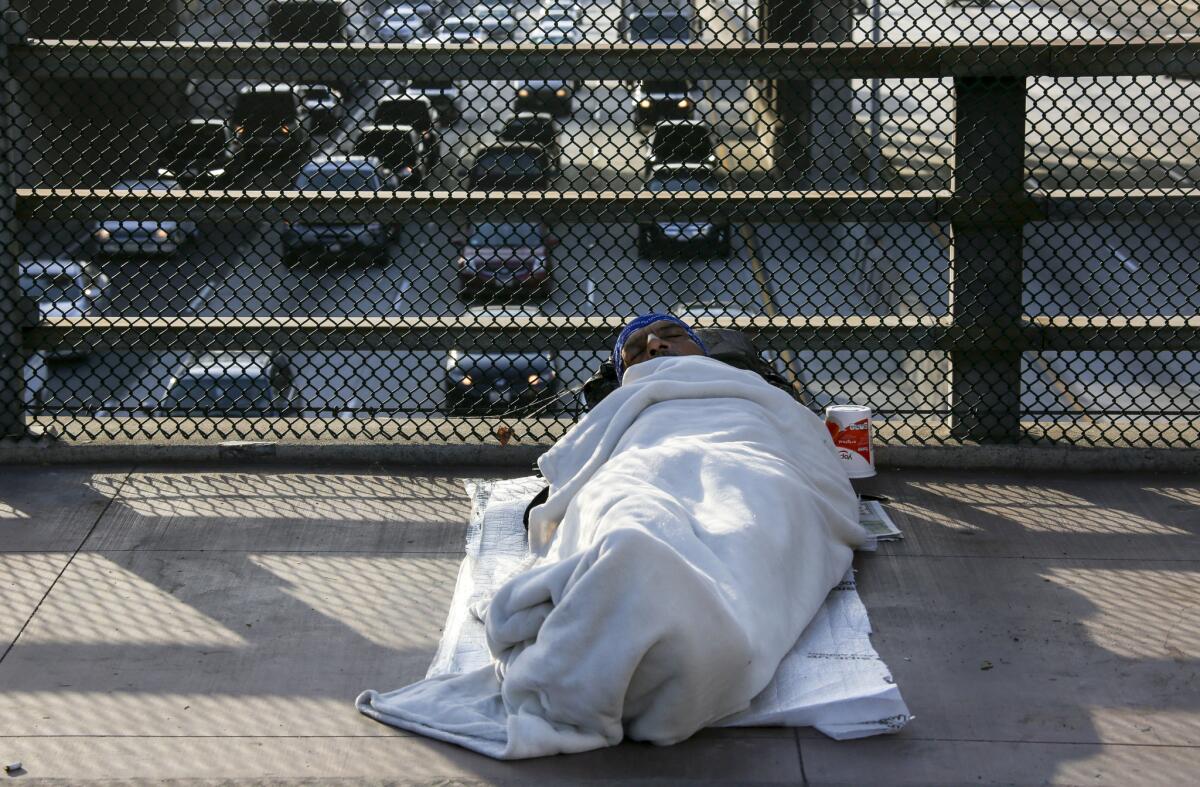L.A. City Council set to seek voter approval for $1.1 billion bond or parcel tax to fight homelessness

Los Angeles voters will likely be asked to approve either a new parcel tax or a $1.1-billion housing bond this fall to help fund the city’s struggle to reduce homelessness.
A key City Council committee on Friday cleared a final pair of money-raising options to put before voters. The decision sets the stage for the full council to vote next week on the parcel tax and bond, only one of which city officials say will ultimately appear on the November ballot.
The council’s coming vote will mark a critical stage in the city’s struggle to deal with a homeless population that has grown steadily in recent years and according to recent estimates now stands at more than 26,000. Some council members have already expressed strong support for a bond, which at least one poll has shown to have a better chance of passing in November on a ballot that will be crowded with local tax measures.
Though general-obligation bonds are typically accompanied by a property-tax increase, California voters have historically shown themselves more likely to approve them than initiatives labeled straightforwardly as taxes. Both the bond and parcel tax would require two-thirds approval.
However, a report released this week by city analysts questioned whether income from a bond devoted specifically to housing would provide the flexibility necessary to enact a city homelessness strategy that includes social services and potential partnerships with private developers. A parcel tax would offer more freedom, the report concluded.
To give city officials more time to decide, Council President Herb Wesson said he would resort to an unusual procedural maneuver that would extend the end-of-month deadline to approve a final ballot initiative for voters’ consideration.
Instead of voting to advance just one option, Wesson said, he would urge the full council to approve measures for both the bond and parcel tax. The city would then have until mid-August to pick one and withdraw the other from the ballot.
Column: Tired of homelessness? Here are some opportunities to take action »
“Every second, every minute, every day that we can give ourselves to continue to vet this issue, I think it’s in our best interest to do that,” Wesson said at the Friday meeting of the Rules Committee. “I think it’s important that we not allow ourselves to be rushed by deadlines.”
Earlier this year, the city adopted a plan to reduce homelessness that would require at least $1.85 billion over the next decade to build or lease housing for those who live on the streets. With the city’s budget still in fragile condition -- and despite Mayor Eric Garcetti’s significant increase in funding for homelessness initiatives in his most recent budget -- a consensus has taken hold at City Hall that a new source of revenue is needed to fund the plan.
The bond being considered would begin boosting property taxes in 2018, according to a report from Chief Legislative Analyst Sharon Tso and City Administrative Officer Miguel Santana. For a home assessed at $327,900, the property tax to fund the bond would rise to a maximum of $88.01 per year by 2026, then gradually decline until it ends in 2045.
On the streets of Sacramento you can see it, and on the streets of Los Angeles you can feel it. And this cannot be solved by local government alone.
— Eric Garcetti, mayor of Los Angeles
A parcel tax, unlike a standard property tax, is assessed at a flat rate and not as a percentage of a property’s assessed value. The parcel-tax proposal discussed Friday would levy an annual tax of about $102 per parcel, generating $80 million a year in revenue for the city.
Garcetti said in a brief interview Friday that he would actively support whichever of the two prospective city initiatives would bring in “the most money.” However, he suggested he is still holding out hope that the county and state could help offset a major portion of the cost for the city’s plan.
In recent weeks, Los Angeles County Supervisor Mark Ridley-Thomas has been forcefully lobbying in Sacramento for permission for the county to impose a “millionaires’ tax” on large incomes that would fund homelessness programs. The proposal appears all but dead, however, and Gov. Jerry Brown has said he would not support it.
“The question I have for the state is, ‘If not that, what?’” Garcetti said. “What role, and how will the state contribute significantly and for a series of years to both the services and housing needs that you see in this state? On the streets of Sacramento you can see it, and on the streets of Los Angeles you can feel it. And this cannot be solved by local government alone.”
Jerry Jones, director of public policy at the Inner City Law Center, praised the council for moving forward with a final round of funding options. He said a $1.1-billion bond would not be enough to address homelessness but that it was “a start” – and seemed to have higher odds of success at the ballot box than a parcel tax.
“I think that’s the whole calculation going on right now,” Jones said. “Based on talking to people here [in City Hall], that seems to be the dominant concern: ‘We don’t want to put something on that’s going to lose.’”
Also on Friday, the council’s Rules Committee formally approved two other measures to appear on the November ballot: A charter amendment restructuring the governing board and hiring process at the city’s Department of Water and Power, and a measure backed by labor unions that would tweak the city’s development regulations to encourage the building of more affordable housing.
Follow @petejamison on Twitter
ALSO
San Diego places rocks under freeway to move out homeless ahead of baseball’s All Star Game
L.A.’s homelessness math is a bit off — totals are the same but increases are smaller
More to Read
Sign up for Essential California
The most important California stories and recommendations in your inbox every morning.
You may occasionally receive promotional content from the Los Angeles Times.











